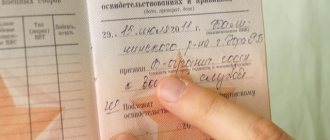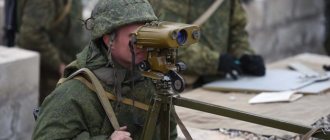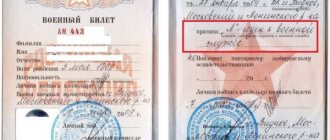A military ID is usually understood as a document received by a citizen shortly before the start of service in the Russian army. A similar document is also issued in cases where a man is completely exempt from military duty or is enlisted in the reserves after service.
A military ID is a kind of document that describes all the information about the conscript regarding his age, place of residence, marital status and health.
When receiving a military ID, many begin to be surprised when they notice a note on it indicating the presence of a certain article. The article indicates the presence of a certain disease identified in a conscript during a medical examination. Without appropriate medical education, not a single conscript will be able to understand what this mark means, what health limitations it indicates, and most importantly, what it prohibits in future “civil life.”
The fact is that there are a lot of articles in the military ID, on the basis of which service in the armed forces is simply impossible. Many diseases in the future do not allow a man to get a good job, obtain a higher education, obtain the right to drive a vehicle or the right to obtain a weapon. However, there are also diseases that can be cured, after which one can repay one’s debt to one’s homeland.
What category of suitability corresponds to the articles
Taking into account the letter attached to the serial number of the article, doctors determine the fitness category:
- point a, “D” - absolutely unsuitable for conscription into the armed forces;
- point b, “C” – limited validity;
- point c, “D” – the conscript is unfit, then only temporarily;
- point d, “B-4” is valid, but there are some minor restrictions.
The selected notation for the explanation of the article is composed in accordance with a simple pattern. Having studied the document, many things fall into place; the conscript will understand what was written on his military ID.
Is it possible to get a driving license?
Article 14 in a military ID leads to certain restrictions that in one way or another affect a man’s life. In this regard, questions often arise about whether it is possible to obtain a driving license with such a registration. To give an accurate answer to them, it is necessary to take into account a lot of nuances. The most important among them is the current state of health of the person.
According to statistics, men with minor mental disorders that make them under Article 14 are successful in obtaining a driver's license in 90% of cases.
Young people who have severe forms of mental pathologies, for which Article 14 of various categories are awarded, should not count on obtaining a driver’s license. In this state, a person’s behavior is unstable, so driving is prohibited for him.
A psychiatrist is considering the possibility of a man with Article 14 obtaining a driving license. All people who plan to obtain a driver's license must undergo examination by him, since this is a mandatory procedure for potential drivers.
A psychiatrist conducts a full diagnosis of a person with suspected mental disorder. He must personally verify the presence of the disease, and not refer solely to the mark that the patient has on his military ID. After this, the specialist makes a decision on whether the man can drive or not.
Is it possible to change or remove an article?
It is impossible to completely remove an article from a document. We are talking about the most severe and even mild diagnoses. Milder pathologies that can be eliminated after long-term treatment, which indicates the possible removal of the diagnosis itself. However, such a procedure takes a very long time. The man needs to confirm at the next medical examination, which is possible once every five years, that the disease no longer exists. To do this, you need to write a corresponding application for a repeat medical examination.
[ads-mob-5]The application is submitted to the regional or city PND, to the chief doctor. The date of the meeting of the medical commission will be announced a little later, where you will need to appear for re-examination. Most often, the applicant is placed in a hospital department, where observation takes place for a period of two weeks to a month. The man does not receive any medicine. Medical diagnostics, various types of testing, and routine observation are performed, after which specialists draw conclusions about the possible removal of the diagnosis. However, even in the case of a positive decision, the article itself will remain written down in the military document.
Article 14 Schedule of illnesses
Organic mental disorders
Examination of citizens suffering from mental disorders is carried out after examination on an outpatient or inpatient basis in a specialized medical organization (specialized department of a medical organization).
| Disease schedule article | Name of diseases, degree of dysfunction | Category of suitability for military service | ||
| I graph | II Count | III Count | ||
| 14 | Organic mental disorders: | |||
| a) with pronounced persistent mental disorders | D | D | D | |
| b) with moderately severe mental disorders | IN | IN | IN | |
| c) with mild short-term painful manifestations | G | G | G | |
| d) with persistent compensation of painful disorders after acute brain disease or closed craniocerebral injury | B-4 | B | B | |
The article provides for psychoses, other mental disorders, changes in personality and behavior caused by damage and dysfunction of the brain (trauma, brain tumors, encephalitis, meningitis, neurosyphilis, as well as senile and presenile psychoses, vascular, degenerative, other organic diseases and brain lesions ).
The fact of treatment (treatment) for injuries, neuroinfections, organic diseases and brain lesions is confirmed by medical documents.
Point “a” includes pronounced, protracted psychotic states, as well as mental disorders manifested by persistent, pronounced intellectual-mnestic disorders or pronounced personality changes of a psycho-organic type.
Point “b” includes conditions with moderately severe asthenic, affective, dissociative, cognitive, personality and other disorders, as well as psychotic conditions with a favorable course.
Point “c” includes transient, short-term psychotic and non-psychotic disorders that arise as a result of acute organic diseases or brain injuries, resulting in recovery or mild asthenia in the absence of signs of organic damage to the central nervous system.
Point “d” includes states of persistent (at least 1 year) compensation of painful manifestations after an acute illness or brain injury in the absence of mental disorders and phenomena of organic damage to the central nervous system, when there are only isolated scattered organic signs, without dysfunction.
Article in the army "Homesickness"
Unlike other clauses that provide for a young man’s incompetence to serve in the armed forces, there are medical indications for the commission of a young man who has already been drafted.
The list of such diseases consists of ailments in various fields, including psychiatry. Thus, Article 17 with subcategory “b” is determined for soldiers serving. The soldier’s symptoms consist of constant worries and emotional stress, which does not allow the conscript to cope with the responsibilities assigned to him in the army. Such symptoms have a common characteristic defined as “homesickness.”
A soldier with such behavioral traits is sent to the Military Military Command, where, after examining his condition, a decision is made on his further fate.
There are several such conclusions:
- dismissal from the ranks of the Armed Forces with registration in a psychodispensary;
- recognition of partial unsuitability, but with the possibility of further special military training subject to certain restrictions.
This precedent is often used by young men who do not want to undergo training in the Armed Forces. There are many tricks that will allow you to avoid being liable for military service using this paragraph. However, not everyone understands that in later life this deception can be revealed with certain consequences for the man.
How to remove an article - algorithm
You should proceed like this:
- draw up a petition to the head of the psychoneurological dispensary (or district clinic), the text of which must contain a request for re-examination;
- take a reference from a job or institute;
- undergo examination by specialists;
- obtain written confirmation of the incorrect diagnosis;
- visit the military registration and enlistment office and there submit an application to change the suitability group.
At the same time, there is a more radical and simpler way. The whole point is that it is not allowed to indicate articles on a military ID. The corresponding norm is given in the Russian government decree number 217.
Thus, it is enough to send only an application to replace the document in hand. Here it is advisable to use the wording “illegal indication in a military ID of data that is a medical secret.” Also provide links to:
- 323rd Federal Law (Article 61);
- 719th government decree of 2006.
Practice confirms that usually military registration and enlistment office employees act in this case very quickly and always in the interests of the applicant.
Article 18A: is it really that scary?
Yes, she's just terrible. A citizen who falls under this article is recognized as legally incompetent because his mental state does not allow him to control his behavior and actions. He cannot be in society, therefore, military service for him is not only questionable, but categorically prohibited.
Mental disorders are so severe that such people can spend a huge amount of time in hospital treatment in conditions of complete isolation, because they can be dangerous and aggressive. Therefore, there can be no talk of any military service here.
Article 14b – legal aspect
Previously (before 2005), this article could be removed from a military ID only once every 3 years based on the results of re-examination at a medical institution. True, we were talking only about those cases when the letter designation was up to category “B” and the candidate was not fully 27 years old.
Today this has been abolished by a special order of the Government. This is due to the fact that the persons whom the commissariat sent to the reserves do not serve in military service in peacetime conditions, and therefore do not represent any interest to the state.
Article 14b in the military card of a candidate for the army, the decoding of the letter code of which is presented above, is a complete basis for deferment or exemption from the army. Every young man with such an article in the World Bank has every right to request a new medical examination to remove the diagnosis and eliminate the article from the document.
This act cannot be considered a signal that the military commissariat will immediately redirect the candidate to an additional medical examination, but it is quite possible to initiate it when the opportunity arises. For example, during the period of a new conscription.
If this does not happen, then, according to Art. 256 of the Civil Code of the Russian Federation, a candidate (a young man of military age) has the right to submit a corresponding application to the courts. If the conscript is under 27 years of age at the time of filing the application, the court will grant the plaintiff’s request for re-examination. If the result is positive, the guy will have to serve the required term, but the charge will be removed from him.
The deadline for filing is no later than 3 months from the moment he learned about the inclusion of this article in the military ID. Even when the deadlines were missed, this cannot be considered a valid reason for the plaintiff to be refused. In such cases, the court has the right to hold an additional hearing to determine the reasons for the delay. If the grounds do not seem compelling to the court, it may refuse the plaintiff without giving the conscript a chance to correct the current situation.











